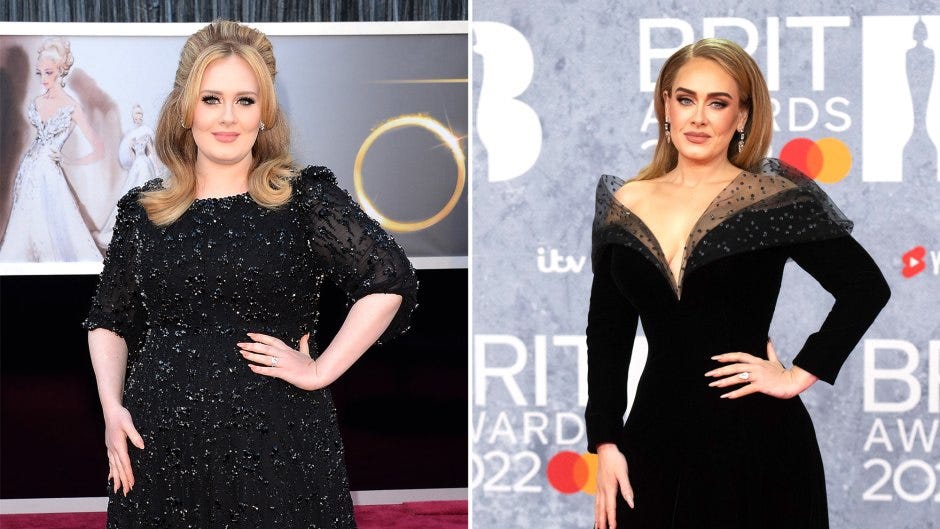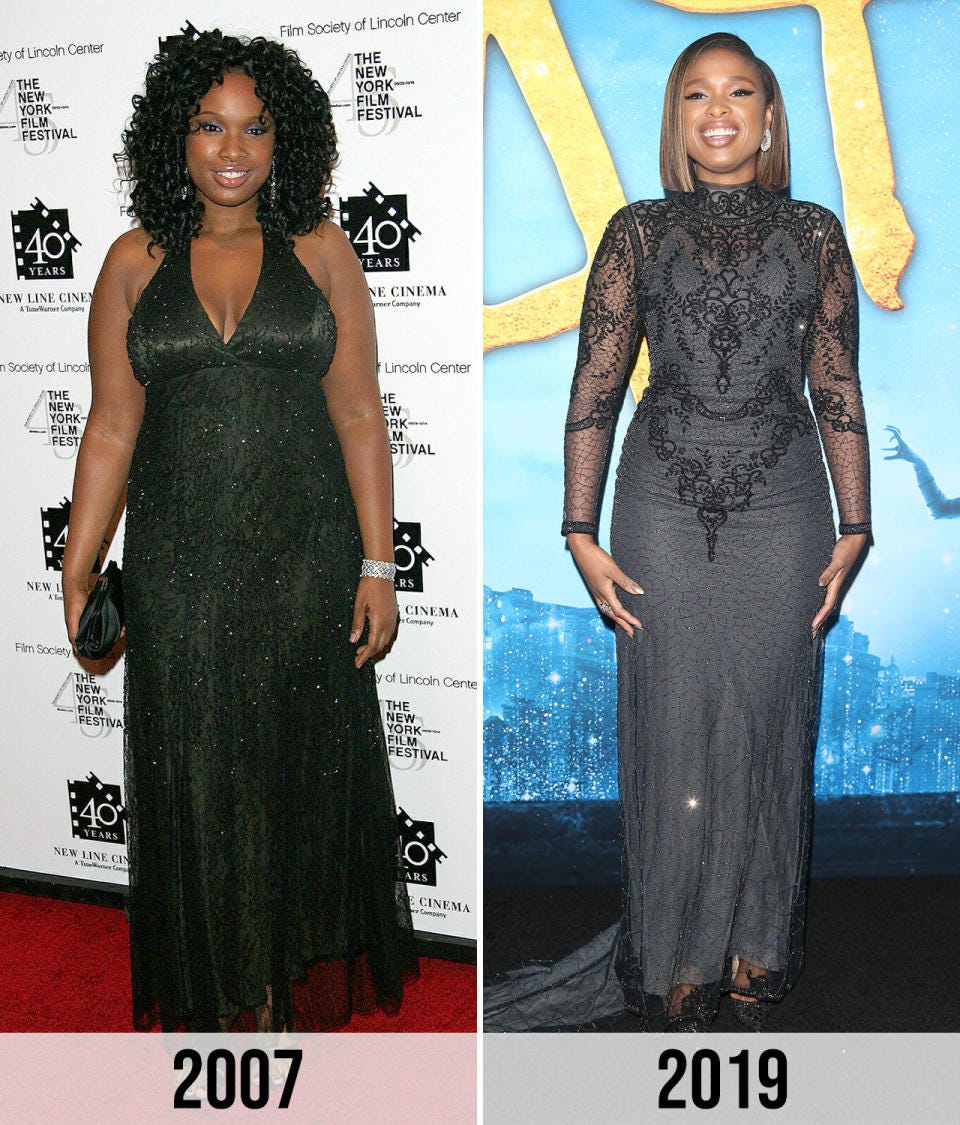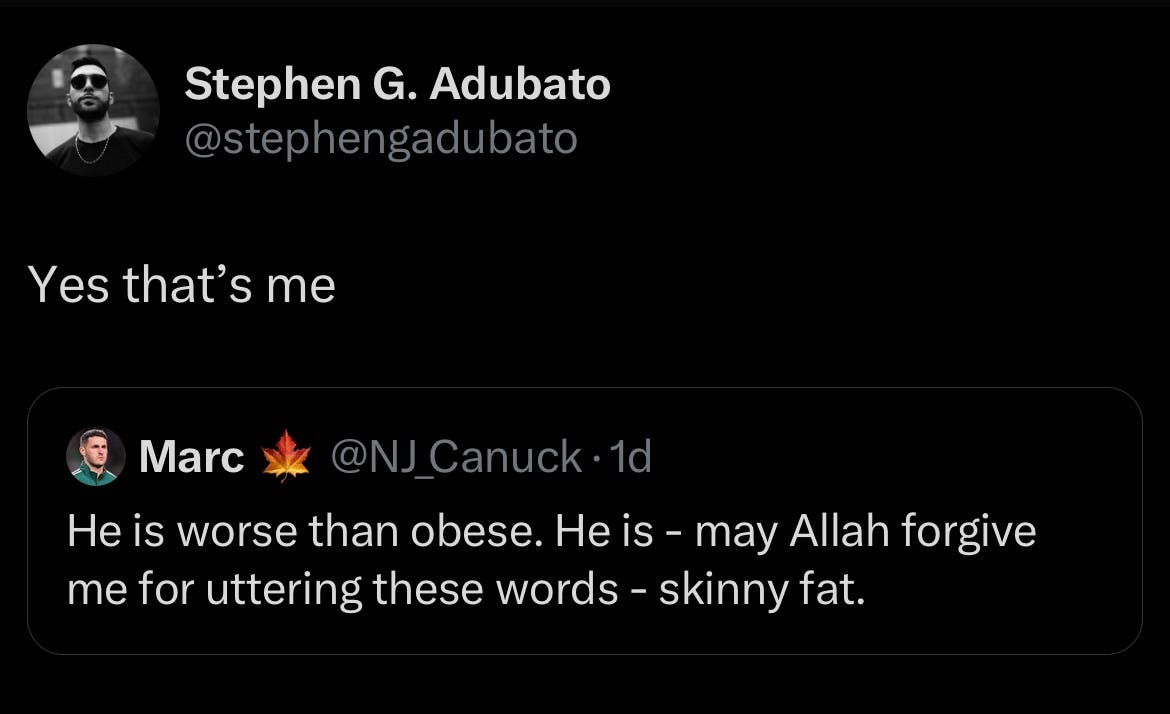Ozempic. Dysmorphia. Anorexia. Looksmaxxing. Powerlifting. Ray peat. Fat positivity.
Body-image discourse has been all over the place, lately. In an salon, Abigail Favale, , and I attempted to break it all down [listen on YouTube, Spotify, or Apple]. I thought I’d hash out some of my thoughts in a little more depth here.
Trigger warning to those who get sensitive with issues having to do with body image/eating disorders. My words in this post are [characteristically] blunt and obnoxious. So take it all with a grain of salt (or artificial sweetener).
My gorgeous fat grandma
My grandmother, who was born on a small Greek island and immigrated to New Jersey in 1959, used to boast that she had always been “a little jolly”—her euphemism of choice to refer to her body type which, by medical standards, was obese. It’s true; even in the black and white photos of her as a young girl in Greece during the time of the German occupation (where food was scarce), she was big-boneded, as they say. Upon her arrival to the US, she only grew in size, thanks to the abundance of food and her hearty appetite. Her weight (and appetite) further increased when she started taking psychotropic drugs to treat her mental health issues.
My grandmother, on top of having a pretty face, had a figure, even when her BMI entered into the bracket for obesity. Furthermore, she knew how to pick clothing from the plus-sized department with the right cut, colors, fabrics, and patterns that accentuated her figure. And above all, her look was completed by her irrepressible confidence, high self-esteem, and spunky personality.
Never once did my grandmother feel ashamed or embarrassed for her size. She even enjoyed poking fun at it, and allowing others to poke fun at her for it.
My grandmother also enjoyed criticizing other people’s appearance. She told my mother that she needed to eat more–she looked emaciated, and because of this, no one would want to date her. She also told my mother that she should stop putting on so much makeup as her face was “already beautiful as it is.” I remember sitting in the car with her in the Whole Foods parking lot as we broke open a bag of organic tortilla chips and 365-brand fresh guacamole. “Take a look at that lady behind us…she’s so fat!” she remarked to me, as she scarfed down a chip overflowing with guac. At a family party, she asked my cousin why she’s so fat given the fact that her mother isn’t fat.
My grandmother was not projecting her self-loathing when criticizing other people–again, she loathed none of her appearance. Rather, her assessment of other people’s bodies was a matter of objectivity and curiosity. Some fat people look ugly, some look good. Same with skinny people. This, to her, was a matter of fact. She was just stating what she observed. Beauty, in her eyes, was determined less by size, but by the way one presents and carries themself.
Because of my grandmother, I always found myself confused by “body positivity” rhetoric. There are plenty of overweight people who are genuinely attractive, dress well, and who have charming personalities that enhance their physical appearance. There are thin people who are ugly, don’t dress up, and have repellant personalities. There are also physically unattractive people–both fat, skinny, and everything in between–whose personalities attract people, thanks to their confidence, talent, skills, sense of humor, or great kindness.
Emaciation and disenchantment
In our disenchanted age, where we oscillate between worshiping ourselves or other people’s opinion of us, we lose sight of the body as a vessel of enchantment–both as a gift from God and temple of the Holy Spirit ordered toward self-gift and generativity, and as aesthetic sign of a ideal form of beauty. This oscillation churns out flat personality types, that–cut off from any sense of being in relation to some higher ideal, whether virtuous or aesthetic–are crippled by insecurity.
In our salon discussion, Abigail Favale referred to her Church Life Journal essay in which she links both the phenomena of body dysmorphia and gender dysphoria to the “disenchanting” (in the Taylorian sense) of the body.
The female body, in our cultural imagination, no longer signals creation, nourishment, and primal compassion, but rather the prospect of sterile pleasure. Our bodies are tools for gratification. That is what becoming a mature woman felt like—like I was seen as less than a whole human being, and more as an instrument of sexual pleasure.
It was for this reason, she realized in retrospect, that she “never liked having breasts.” The impulse to feel disgust toward one’s curves as a female is driven in part by the withering of the cosmic symbolism of body parts like breasts, hips, and belly fat (and genitals), which is what oftentimes leads women to attempt to alter their bodies by means of self-starvation or bodily mutilation. (Though the “Kim Kardashian” effect, which has renewed esteem for curves—big boobs and booty—can be said to be an attempt to recover a sense of the enchantedness of the body).
Paglia speaks to the how the disenchanted middle-class assimilated suburban girl is often prone to feeling disillusioned with her body’s curves—which, to her, lack any sense of a symbolic meaning, and thus, are a problem to be eliminated:
The real turmoil is going on inside the nuclear family, which, with its caged quarters and cheerful ethic of "togetherness," must generate invisible barriers to the threat of incest. Here is the real source of the epidemic eating disorders, blamed by incompetent feminist analysts on the media. Anorexia, for example, remains primarily a white middle-class phenomenon. The daughter stops her disturbing sexual maturation by stripping off her female contours, the hormone-triggered fleshiness of breasts, hips, and buttocks. She wants to remain a child, when her innocent erotic stratagems had no consequence. Again and again…I have seen the flagrant hair-tossing and eye-batting mannerisms of Daddy's little girl, who since childhood has used flirtation and seductiveness to win attention within the family.
Provocation and denial are built into the circuitry of the white middle-class girl, with her depressing flatness of sexual imagination, her strange combination of "low self-esteem" with hectoring moral superiority in groups, inflamed by feminist rhetoric. The eating disorders are symptomatic not of external forces or media conspiracies but of a major breakdown in the female sex role. American world, the successful woman is now defined in exclusively professional terms. The role of mother, still central in Latin and Asian cultures, has been devalued.
Rene Girard also chocks up the onslaught of eating disorders to the spread of disenchantment:
The people with eating disorders are not the people with a religious hangover, the traditionalists and the fundamentalists, but the most "liberated."
Our modern bulimic is eating for herself, to be sure, but she is vomiting for others, for all these women who are watching each other's waistlines. Her radical freedom is synonymous with her enslavement to the opinion of others. Mimetic desire aims at the absolute slenderness of the radiant being some other person always is in our eyes but we ourselves never are, at least in our own eyes. To understand desire is to understand that its self-centeredness is undistinguishable from its other-centeredness.
As long as we are not provided with a goal worthy of our emptiness we will copy the emptiness of others and constantly regenerate the hell from which we are trying to escape….We thus re-invent masters more ferocious than the God of the most Jansenist Christianity. As soon as we violate the thinness imperative, we suffer all the tortures of hell and we find ourselves under a redoubled obligation to fast
Similarly, Baudrillard commented that the esteem for the “scrawny and emaciated” body type is symbolic of our attempt to “censor” nature and exalt artifice: “the lines of the models and mannequins…are simultaneously the negation of the flesh and the exaltation of fashion.” He continues:
Hygiene, in all its forms, with its fantasies of sterility, asepsis, prophylaxis or, by contrast, of promiscuity, contamination, pollution—tending to conjure away the 'organic' body and, in particular, the functions of excretion and secretion - aims at a negative definition of the body, by elimination, as though it were a smooth, faultless, sexless object, cut off from all external aggression and thereby protected from itself…..But a signifier of what? Of forgotten, censored desire. This is why the (phobic, obsessional) hygienic compulsion is never far away. Overall, however, the preoccupation with hygiene founds a morality based not on pathos, but on play: it 'eludes' deep fantasies in favour of a superficial, cutaneous religion of the body.
On that note, excess fat can be symbolic of either love for life or disdain for life. There’s a big (no pun intended) difference between eating your feelings of joy vs. eating your feelings of misery. Paglia wrote in “Southern Women: Old Myths and New Frontiers” of the warm, sassy, wise, joyful, and fat Southern “country woman”—one of several iterations of Neumann’s “Great Mother” archetype—whose large size was emblematic of her being rooted in the earth, a grounding force who both nourished and admonished, entertained and instilled fear, echoing the ancient image of the Venus of Wildendorff.
But as much as fat can be symbolic of fullness and fertility, it can also be symbolic of emptiness, sterility, apathy, nihilism, chaos, destruction, and bureaucratic bloat (…as can emaciation).
You don’t have to be beautiful
I have written previously about the body positivity movement’s resistance to embracing the fact that certain types of physical features are objectively more beautiful than others. Surely, beauty is in the eye of the beholder–to a certain extent. And everyone has their “type.” But from an aesthetic, artistic point of view, there’s a reason why we are inclined to say some people have “good” bodies, and others don’t–and no, it doesn’t all boil down to a matter of “social conditioning” (thought that certainly does play some role).
The relativization of beauty and its reduction to being a mere matter of social norms, and its impact on our “self-esteem,” is a reflection of the shift toward disenchantment and the emptying of the metaphysical—whether monotheistic/virtuous or pagan/aesthetic—implications of the category of beauty.
Take the Puerto Rican physicist and priest Lorenzo Albacete remembers the time a woman asked him if “the resurrection of the body was a metaphor.”
Albacete was never at a loss for witty responses to serious theological questions. He continued by reflecting on his experiences in southern California, where “you see many bodies that make you think of the resurrection as a worthwhile thing, as a metaphor for their beauty and attraction. … What my heart wants, is the real possibility of having a body like those who at that very moment could be seen around the pool during the shooting of an episode of some television series. I have no idea what my risen body might be like, but if such a thing does exist, I want it to be closer to the bodies at the pool than to a metaphor.”
Though she comes from a pagan perspective, Paglia echoes Albacete’s intuition that one can appreciate and contemplate the spiritual implications of bodily beauty without feeling the need to appropriate the,.
“I don’t have to be beautiful,” claims Camille Paglia. “I can love [beauty] in someone else…to be in the presence of beauty…a beautiful object, a beautiful person, a beautiful magazine, a beautiful picture…to me, this is spiritually transformative….We should not have to apologize for reveling in beauty,” claims cultural critic , in response to the feminist writer Naomi Wolfe. “Beauty,” continues Paglia, “is an eternal human value. It was not a trick invented by nasty men in a room someplace on Madison Avenue.” Paglia goes on to critique Wolfe’s proto-body positivity polemic which initially was a reaction to fashion magazines’ imposition of “unrealistic” beauty standards on everyday women as being overly “provincial” and rooted in a narrowly Anglo-Saxon moral and aesthetic ethos.
From a platonic point of view, certain forms are reminiscent of an eternal ideal form of beauty, which our souls naturally recognize and desire. Just because my skinny fat body does not fit that ideal, it doesn’t mean I have to conform to it. Nor do I have to suppress my instinct to declare that said form is more ideal than the form of my own body (more on this below).
But Paglia’s assertion banks on the assumption that one understands that their worth comes not from other people’s opinions, but from something more constant, more fixed–like one’s skills, talents, virtues, or from the gratuitous, unmerited love of God.
Needless to say, there’s no virtue in shaming people for anything. But I also don’t think it would be very prudent to police commenting1 on people’s appearance and to force people to deny the reality that not everyone and everything is aesthetically (or morally) beautiful. As much as encouraging charity and discouraging disrespect are laudable goals, this should not come at the cost of having to censor the objectivity of reality. No, you don’t have to pretend that everyone and everything is categorically beautiful. Some are more beautiful than others. But everyone can be attractive (in the broader sense of the term), and everyone has infinite dignity stemming from their being made in the image of God.
Again, as much as other people’s opinion of us doesn’t determine our worth, we shouldn’t dismiss the value of people having a high opinion of us. We should aspire to be respected by others, primarily for our moral virtues, but also for our skills, and even for our appearance. You should by all means take pride in your physical appearance—not because you want to be liked, but because you actually recognize your own dignity and respect yourself…and want people to know that they should respect you too. The problem is when we attempt to change ourselves for the sake of feeding our insecure craving to be approved of.2
[Don’t] Shake [off] what your mamma gave ya
Perhaps due to the influence of my grandma, I’m of the opinion that people should aspire to maintain their natural body type (unless certain medical factors make that impossible, like thyroid/hormonal issues or taking heavy-duty SSRIs). If you are naturally plumpy, then be plumpy. If you’re skinny, be skinny. If you’re muscular, be muscular. If you’re skinny fat (like me), be skinny fat. When exercising and dieting, it should be done with the intention to maintain your natural body type/weight, and not to fit some “societal standard” that doesn’t biologically pertain to you.
This is why I don’t understand the very pretty and plump (but not unhealthily obese) celebrities who lost a significant amount of weight (I mean, yes, I understand that they did it because “our society” praises skinny women). Take Adele, Jennifer Hudson, Danna Paola, and Ariana Grande. Their recent weight losses make them look not only not like themselves, but unhealthily emaciated. (No, I’m not shaming or judging them. If they suffer from an eating disorder or body dysmorphia, I am very sorry for them. I’m just stating something objective.)
Like my grandma, I’m also of the opinion that everyone can be attractive if they try to be. Figure out how to dress in a way that complements your body type. And if you’re just downright ugly (in the face), bank on your personality. Amplify your intelligence, artistry, sense of humor, kindness, etc.
Are you positive that you feel so positive about your body?
When I say everyone and every body type can be attractive, I mean something different from what is implied in mainstream body positivity rhetoric. Let’s take the example of Lizzo. Lizzo likes to tell us that she is beautiful and that she’s proud of her body type, which she talks about so frequently that it has come to be inextricably tied to her public image (perhaps more so than the quality of her music…which is mid).
There is something unconvincing about her type of confidence. It feels forced. Physically, she isn’t very appealing–not because of her size, but because of how she carries herself and dresses. And personality wise, her confidence comes off as very in your face and thus superficial and not fully-developed…rather than being rooted in her lived experience and flowing organically out of her personality.
Someone who has to repeatedly tell you how beautiful they are and how confident they clearly do not really feel that they are beautiful or confident. And this is what I think is missing from the body positivity movement: Surely, anyone can be beautiful in their own way. But something is beautiful not because one decides to call it beautiful, but because it corresponds with some objective ideal. If your appearance and/or personality do not conform to some type of ideal, then you can’t just declare that you are beautiful because you say so. There are many types of beauty, but you actually have to try be beautiful. (Similarly, one isn’t smart just because one says so, nor are they a loving person just because they say so.)
Consider larger ladies like Aretha Franklin whose size was never a part of her “act” or marketing campaign. She was just an extremely talented (and fairly pretty) singer who happened to be bigger. People respected her not because she was “loud and proud big woman,” but because of her talent and grace.
On the other hand, just because one talks often about their appearance, it doesn’t mean they are categorically insecure about their image. Take people like the comedienne Mo’Nique. When she repeatedly states that she’s proud to be a “big woman,” it never comes off as obnoxious or grating—in part because she was talented, well-dressed, and her confidence was deeply-rooted in her personality and, thus, was compelling. You never felt like she was forcing you to say she was an attractive person. Most people naturally felt it to be true. If you look at the comments on her standup videos on YouTube, numerous people commented on how beautiful she was…because she actually is beautiful, physically and personality wise.
Mo'Nique often told her fellow big women to not despair about finding a partner. Surely, many men are conditioned to think thin women are prettier. But plenty of men appreciate a beautiful woman who is bigger—it all comes down to how you carry (and dress) yourself.
Skinny fat and proud
Friend of the pod Joe Enabnit is of the opinion that taking care of one’s body is one way to express gratitude to God for having given you the gift of your body. Further, for men, building up muscle mass is valuable considering most of us need muscles to fulfill our God-given vocations (carrying out physical tasks—especially of you do manual labor for a living, caring for and protecting vulnerable people—especially if you’re a dad, etc).
Joe concedes that although it isn’t morally or practically important, having an aesthetically appealing physique can be valuable in a certain (naturalistic/pagan) sense—as it serves as a symbol of a higher ideal. (Though for a Christian, it’s not very important—only in so far as you try to have a nice body for the sake of taking a moderate sense of pride in your appearance, or if your actual job is to be model).
So what’s a skinny fat bloke like me to do?
I am not a model. I do not make money on IG from posting thirst traps. I do not intend to attract a mate. Thus, I have no business attempting to get jacked.
I do not have children. I am not an athlete. I am too bourgeois to do manual labor. Thus, strength training is a waste of my time.
Sure. I could start lifting and bulking in order to become more virtuous and learn discipline. But every time I try, something [laziness, sugar] seems to get in my way.
The only form of discipline that has worked for me is the tea-cookie-cigarette diet that—ironically—has only served to make me more skinny fat than I already am.
If emaciation is a symbol of (post)modern godlessness, and obesity is a symbol of Western nihilistic decadence, then those of us who are skinny fat are certainly the ones who most offend the Creator. But I’d prefer to think of it a different way: The tea-cookie-cigarette diet has been associated with archetypes including Eurotrash, BPD art heauxs, and mystical saints who have fallen pray to the eating disorder known as anorexia mirabilis—whose resultant skinny fatness renders their bodies completely useless outside of making an offering of them to the only One who sees any use in them…and thus becoming an apophatic sign of That which they most certainly are not (God).
Thus, I’d like to make the case that the skinny fat male is, rather, symbolic of the merging of the two eternal archetypes—of the holy fool and the court jester, the ascetic prophet and the dandy-eunuch—without whom we’d all be lost, and there’d be no one to crack through postmodernity.
[I’m being (half) ironic, obvi…but more on anorexia mirabilis to come]
Some people do it from a place of objectivity and curiosity (I think of the Greek people who say “look at how big that lady is,” not because they find her repulsive and want to mock her, but because she caught their attention, in the same way someone wearing an unusually bright colored shirt or sporting an unusual hairstyle would). Some do it from a place of affection. And some do it to be assholes and mock others.
The latter is the polar opposite of the mentality that churns out people like (a) Lizzo who insist that they do not care much for others’ opinion of her (though they actually do) and thus insist on telling people that they should think she’s beautiful and confident and (b) Danna Paola who is so concerned about what people think that she changes her natural body size and ends up looking unappealing. So by all means, please do take pride in your appearance—but for do it for the right reasons.













As someone who grew up with relentless body shaming from my immediate family, I must say I did not find this triggering at all. On the contrary, I found it healing.
You have reached new heights with this piece! You've thoroughly and accurately diagnosed our predicament and made me laugh throughout my reading. I'm hoping your observation, rooted both in your reading of Paglia and Girard, that women (and men) have been harmed by a culture of sterility. I'm 67 and came of age in the era of "the pill." Early on I wondered why it was considered a good thing to induce a diseased state, i.e. infertility, and label it liberating. Thanks once more for your work.